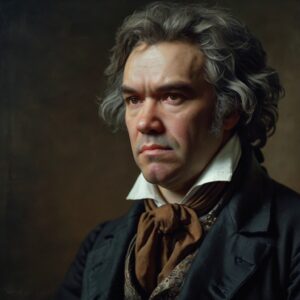Early Life and Struggles
Ludwig’s life, a story like many others of forsaken prodigies began with difficulties. He was born in December 1770 in Bonn, Germany. Coming from a musical family, his father Johann, a musician himself, saw talent in his little son and became his first teacher. His father’s strict and sometimes brutal teaching methods laid the groundwork for what would become an unrivaled dominion in classical music on his part.
 He showed extraordinary musical talent despite the strict discipline. He performed in public while still very young and quickly gained local fame. However, the pressure on young Ludwig increased tremendously because of an overambitious father and the family’s financial difficulties. This difficult home life fueled his early concentration and passion for music and drove him to seek further guidance, first with Christian Gottlob Neefe, who had a considerable influence on Beethoven’s early compositions and musical thought.
He showed extraordinary musical talent despite the strict discipline. He performed in public while still very young and quickly gained local fame. However, the pressure on young Ludwig increased tremendously because of an overambitious father and the family’s financial difficulties. This difficult home life fueled his early concentration and passion for music and drove him to seek further guidance, first with Christian Gottlob Neefe, who had a considerable influence on Beethoven’s early compositions and musical thought.
To Beechovene, greatness could not be achieved elsewhere. He moved to Vienna, which was the focal point of musical activity in Europe. In 1792, he settled in Vienna, carrying ambitions and dreams too big for his years. It was there, among an abundance of opportunities, that he made instant connections with some of the great composers of the time. Joseph Haydn took him under his wing, supplying the young composer with what would prove invaluable lessons in the discipline of music writing.
In his early works, the classical style of his predecessors stood most strongly with occasional strokes of genius that hinted at what was to come. Pieces like his Opus 1 piano trios and his first symphony mixed but enthusiastic criticism. Here he observed classical forms but at the same time sowed the seeds of his revolutionary spirit. The young composer had to establish himself in a town filled with the legends of Mozart and Haydn, a challenge he took on with energy and new ideas.
Rapid Rise and Deafness
Beethoven was an artist on fire at the beginning of the 19th century. During this period, he created amazing number of works: towering sonatas, masterful string quartets, and dazzling symphonies, each breathing new life into classical forms. Two works from this time—the ‘Moonlight Sonata’ and Symphony No. 1—already reveal his extraordinary ability to stir deep feelings.
With fame and success came an ominous shadow—deafness. Around 1801, Beethoven began to realize he had problems with hearing. Starting with a minimal level, it was first perceived as a dullness and ringing in the ears. But it soon turned into a deeper silence—and grew. For any person, this would be a tragedy. But, for a musician, this irony would be a catastrophic blow.
Rather than surrender to despair, he seemed to struggle mightily with frustration and then create, producing works infused with deep sadness and victory. His Symphony No. 3, Eroica, was groundbreaking in its length and—an audacious reflection of his very personal struggles and revolutionary spirit.
The Heroic Period
Around 1803, Beethoven began what is known as his ‘Heroic’ phase. It was a time of passionate, noisy creation—a flood of works that distinctly changed the musical language of the day. By doing so, he’s new sons create music scenarios, in complexity and emotional depth the like had never been in heard each other’s add life to a piece of music.
His Sixth Symphony, ‘Pastoral’, paints a vivid picture of nature captivatingly. It brings a new idea, and the serenity of innovation. In contrast, his Fifth Symphony captures defiance, triumph, and epic struggle, exemplified in the famous four-note—short-short-short-long still reverberates powerfully today. Bold modulations, cyclic forms, and often surprising harmonic transitions marked his works and left listeners spellbound.
Beethoven defied conventions even in opera, a genre he approached quite differently. His only opera, ‘Fidelio,’ a testament to the triumph of creativity over despair, deals with such themes as heroism, liberty, and social justice. It reaffirms his faith in the indomitable power of the human spirit against all odds.
Late Works and Musical Innovations
The “late period” of Beethoven’s career (post-181) saw an aging, nearly deaf composer diving into depths of musical innovation and expressive intensity – a period often considered among the most profound in Western music. His later works became more reflective, introverted, and structurally challenging, forcing even the most seasoned musicians and listeners to rethink their approach to music.
The late string quartets are miracles of structural experimentation and emotional depth. The String Quartet No. 14 in C-sharp minor, Op 131, discards the traditional four-movement form in favor a continuous flow of contrasts that invites comparison to musical stream of consciousness. Such works are often regarded as the ultimate expression of Beethoven’s genius.
The Ninth Symphony is a monumental work in the history of symphonic because, in its final movement, it employs a chorus and soloists—a daring thing to do at that time. The famous “Ode to Joy,” now an anthem of democracy and hope, expresses Beethoven’s unflinching faith in humanity’s triumph.
Personal Struggles and Triumphs
His health deteriorated as he battled stomach problems and the unyielding advancement of his deafness. Financial difficulties and stormy family relations heightened the stress in his life—his tense guardianship of his nephew Karl being a particular flashpoint. Life for Beethoven was never calm.
His hardship gave birth to resilience and reflection, and this was the source of some of his greatest works. He composed more and more complex pieces throughout his life, writing music that he could no longer hear—only imagine, depending largely on intuition concerning musical form and emotional depth.
Through his letters and journals, Beethoven portrays a person who perpetually struggles with his inner demons. The ‘Heiligenstadt Testament,’ a letter he wrote to his brothers in 1802 and which was discovered after his death, reveals the depths of his despair and even suicidal thoughts. However, what shines through is his determination to live for his art—art that he believed could deeply echo the feelings of mankind.
Legacy and Influence
Even though he died in 1827, his works have had an increasing impact through the ages. In each genre he touched, he transformed, making a bridge between classical traditions and the emerging Romanticism.
He played with the formal structures of sonata and symphonies, using motifs and themes that reappear and change throughout a piece in such a way as to create narrative continuity. This had not been done to such depth before, and for this reason, he later became a major influence on composers of the world, including Brahms and Wagner, pale even modern ones who see in him the ultimate artistic integrity.
Beethoven’s struggle against the odds was a journey that inspired people from all walks of life. His in the power and beauty of music, the vision of artistic freedom, and passionate expression of the human condition were and are monumental.
Today, Beethoven’s music is everywhere. People are listening to him in concert halls and films or digital media soundtracks. The universality of his works makes them proper carriers of themes such as unity, hope, and resilience—for example, the ‘Ode to Joy’.
